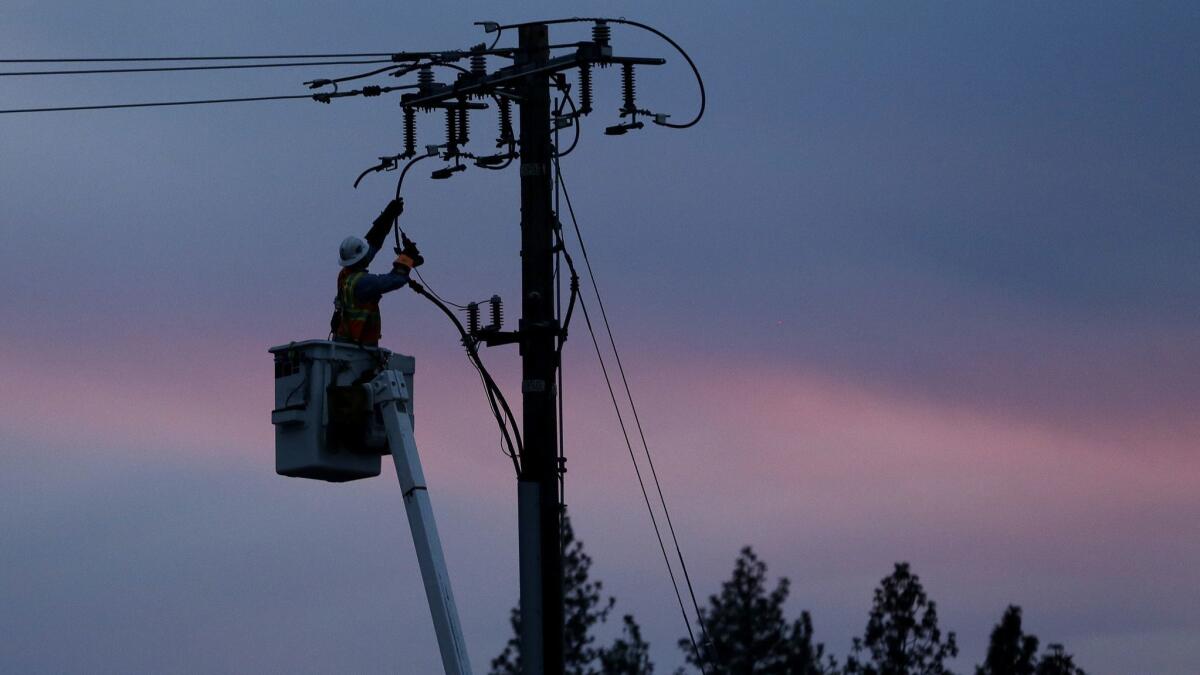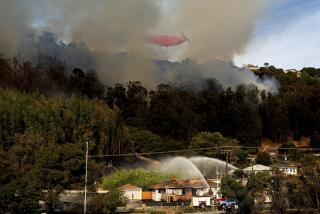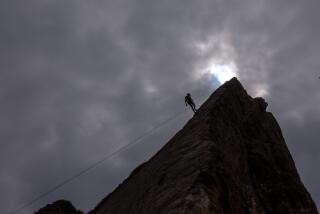California braces for most dangerous fire weather of the season; PG&E already cutting off power to customers

Pacific Gas and Electric began cutting power to nearly 1 million people in Northern and Central California on Sunday amid what forecasters described as the most dangerous fire weather of the season.
The utility institutes the so-called âpublic safety power shutoffsâ ahead of certain weather conditions out of concern that a gust of wind could snap off a tree branch or damage a piece of equipment, creating a spark that could ignite dry brush and spread into a wildfire.
A weather system is expected to bring strong, dry, north-northeast winds through the mountain passes up and down California â winds referred to as Diablos in Northern California and Santa Anas in the southern part of the state. Winds started to pick up in some northern areas Sunday afternoon and were expected to become most widespread and intense overnight into Monday, though critical conditions were expected to last well into Tuesday.
âItâs definitely the strongest wind event of this fire season and probably the lowest humidity as well,â said Duane Dykema, a meteorologist with the National Weather Service in Monterey. âSo overall, these are the most dangerous and critical conditions weâve seen this fire season.â
By Sunday evening, PG&E had shut off power to about 225,000 customers and planned to cut electricity to roughly 136,000 more through the night, utility representatives said. That amounts to more than 900,000 people, assuming that each customer account represents two to three. Shutoffs were expected to continue through Monday into the late evening.
PG&E initially said it might cut power to more than 460,000 customers, or more than 1.1 million people, but later said a combination of favorable changes in the weather forecast enabled it to avoid some shutoffs. The number of customers who were to lose power in Alameda County, for example, was reduced by more than half, from a projected 39,401 Saturday to 16,329 Sunday.
Power is expected to be restored within 12 hours after the winds subside between Monday and Tuesday morning, PG&E said.
The utility said Nevada County would have the most customers with outages, 40,246, followed by El Dorado County, 38,462; Tuolumne, 30,327; Shasta, 24,746; and Sonoma, 23,464.
PG&Eâs equipment has already been blamed for starting some of the worst wildfires in state history, including the 2018 Camp fire, which led to the utility pleading guilty to 84 counts of involuntary manslaughter. PG&E has also agreed to pay billions of dollars to settle damage claims stemming from a series of deadly fires sparked by its power lines between 2015 and 2018.
Most recently, PG&E said California investigators were looking at its equipment as a possible cause of the Zogg fire that started last month in Shasta County, killing four people and burning more than 56,000 acres in the Sierra Nevada Mountains.
The National Weather Service has issued red flag warnings for large swaths of California, including all of Los Angeles and Ventura counties except for the Antelope Valley, as well as the entire Bay Area. The advisory means forecasters have high confidence that dangerous fire conditions will be in place.
The red flag warnings expire Tuesday afternoon in Southern California and Tuesday morning in Northern California, although they might be extended to the afternoon in the North, the weather service said.
Winds picked up Sunday afternoon in the North Bay Mountains above 2,000 feet, with gusts of 30 mph to 40 mph, Dykema said. They were expected to intensify through the afternoon and evening and peak overnight into Monday, with gusts of up to 70 mph possible in mountainous areas.
A much drier air mass was also moving in. Although the Bay Area recorded relative humidity of about 100% Sunday morning, the winds were expected to cause that value to plummet throughout the afternoon and overnight, when humidity values usually increase, Dykema said.
âBy tomorrow, weâll see relative humidity in the single digits, between 5% and 10%, which is extremely low,â he said.
Forecasters say the weather shift is a result of a cold low-pressure system high in the atmosphere thatâs moving down into the Great Basin, causing a change in air pressure that generates winds.
âItâs kind of the typical weather setup that produces these types of events in the autumn months,â Dykema said.
Unlike onshore winds, which bring in moisture as they blow from the ocean over the land, Diablo and Santa Ana winds originate inland, gaining speed, warming up and drying out as they move from higher to lower elevations and squeeze through narrow canyons and passes.
In Southern California, the winds were expected to pick up late Sunday night in the mountains and spread down to the valleys and coast through the pre-dawn hours, blowing most strongly between 4 a.m. and noon Monday, said Joe Sirard, meteorologist with the National Weather Service in Oxnard. Another round of winds was expected Monday night into Tuesday, he said.
Isolated gusts of up to 80 mph were possible in mountain areas, and gusts of 50 mph to 60 mph were expected in valley and coastal areas, he said.
âSo if any wildfires do break out, there could be a rapid rate of spread and downwind spotting for a significant distance,â Sirard said. âIt could spread very rapidly and be exceptionally dangerous to control.â
The state has already seen an early start to a record-breaking fire season, with more than 4 million acres burned, 31 people killed and more than 8,200 structures destroyed over the last three months.
Previously, Californiaâs worst year of fire was 2018, when more than 1.8 million acres burned and more than 100 people were killed, according to the National Interagency Coordination Center.
Lightning in August ignited many of Californiaâs biggest blazes, but scientists say climate change has also contributed to the conflagrations. It was the hottest August on record in the state, and trees and brush were already abnormally combustible after much of the state saw exceptionally dry conditions last winter.
The winds forecast to sweep through the region could take down tree limbs and power lines and affect travel on highways, especially for those in high-profile vehicles, Sirard said.
âItâs by far the strongest Santa Ana event weâve had in 2020,â he said.
People are cautioned to avoid any activity that could spark a fire, and those in fire-prone areas are advised to assemble emergency supply kits and familiarize themselves with evacuation routes.
Temperatures will remain cool through the wind event, with highs in the 70s along the coastal plain, Sirard said.
In fact, the cold, dry air mass and clear skies mean that wind-sheltered areas will become chilly at night, with a freeze watch in effect from late Sunday through Monday morning for the Antelope Valley, where temperatures could drop below 26 degrees. By Tuesday morning, temperatures there could possibly fall into the teens, Sirard said.
âPeople that have sensitive plants should take steps now to protect the tender plants from the cold,â he said.
More to Read
Sign up for Essential California
The most important California stories and recommendations in your inbox every morning.
You may occasionally receive promotional content from the Los Angeles Times.











